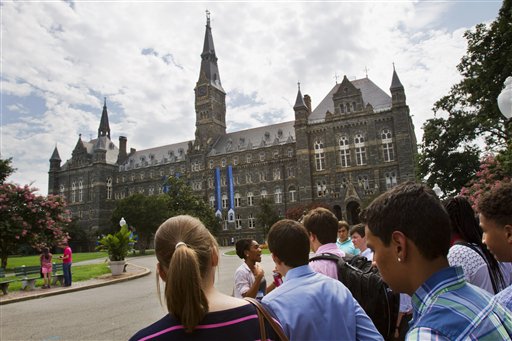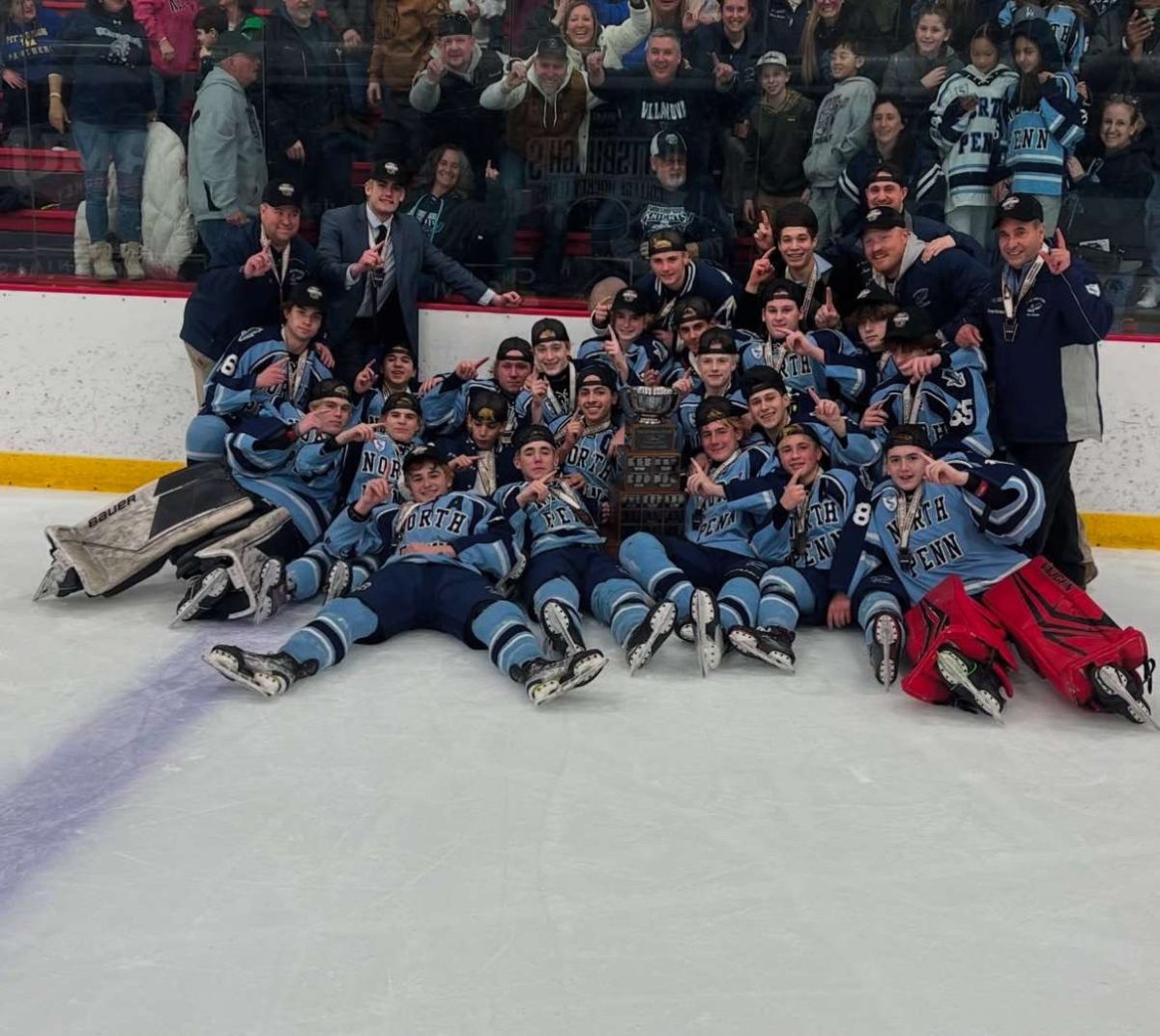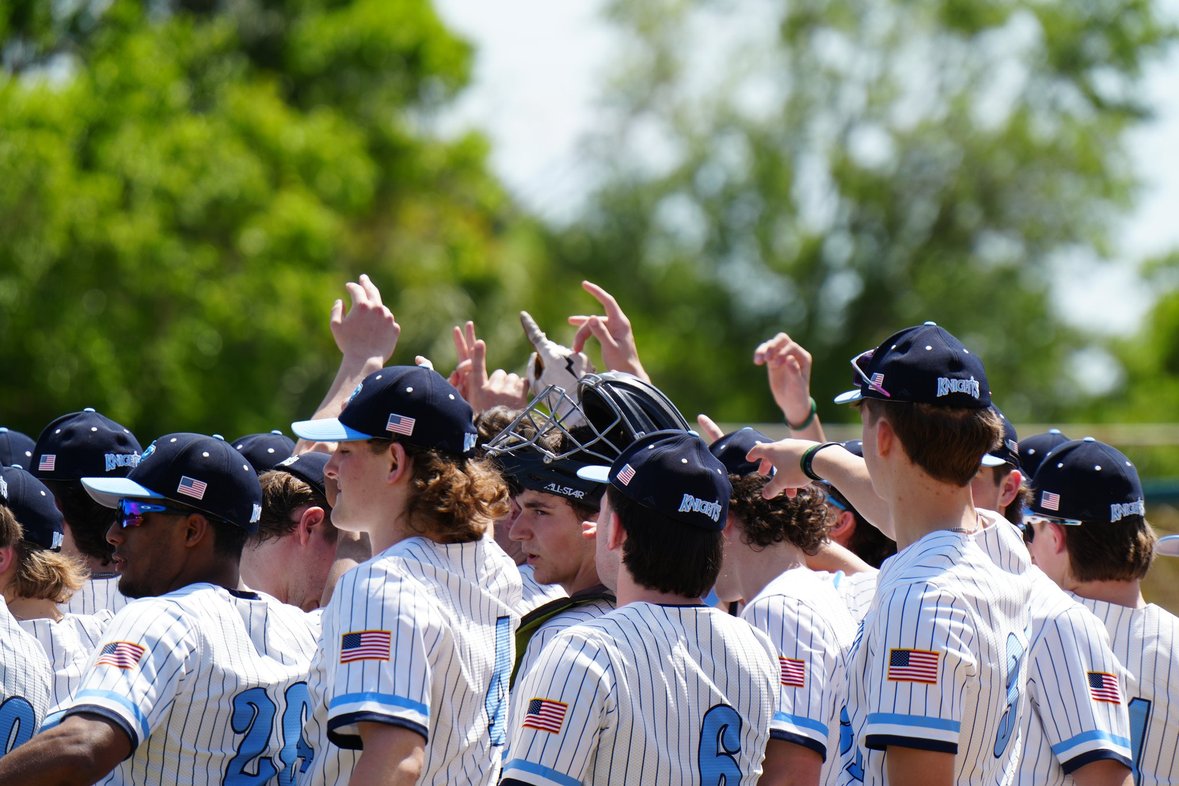Editorial: Coddling of college students hinders education

FILE – In this July 10, 2013, file photo, prospective students tour Georgetown University’s campus in Washington. Despite all the grumbling about tuition increases and student loan costs, other college expenses also are going up. The price of housing and food trumps tuition costs for students who attend two- and four-year public universities in their home states. Thats according to a College Board survey. Even with the lower interest rates on student loans that President Barack Obama signed into law, students are eyeing bills that are growing on just about every line. (AP Photo/Jacquelyn Martin, File)
September 16, 2015
Duke University freshman Brian Grasso felt uncomfortable before he even stepped foot onto campus.
This past summer, while looking through a reading list supplied to all incoming Duke students, Grasso came across a title that he would soon find issue with: Alison Bechdel’s graphic novel Fun Home, an autobiographical depiction of Bechdel’s experience growing up as a lesbian with a gay father.
On July 26th, Grasso took to Duke’s Class of 2019 Facebook page to tell his future classmates something that would set off both agreement and outrage across the country: due to a few of the more graphic cartoons in the novel that “compromised [his] personal Christian moral beliefs,” he would not be reading the recommended selection.
Duke’s Fun Home controversy is only the latest in what has become a seemingly relentless parade of campus outrage and political correctness: from the rise of trigger warnings to the policing of microaggressions, it sometimes feels as if colleges and universities are starting to cater to the most easily offended of students.
While these hypersensitive students are certainly in the minority, their demanding that something be done to combat even the smallest offense and discomfort has sometimes led to the implementation of policies that ultimately affect every person on campus.
Take, for example, the “Bias-Free Language Guide” that was published and subsequently retracted from the University of New Hampshire’s website earlier this year. The guide, which was created by a small group of students and never officially endorsed by the university, introduced a series of euphemisms so sterile that many of them bordered on hilarity. Terms that were once used without a second thought were deemed “problematic” by the guide, which also suggested “preferred” terms to be used in their place. “Senior citizens” were now to be referred to as “people of advanced age;” “poor people” were to become “people who lack the advantages that others have;” “rich people” became “people of material wealth;” and, in the example that drew the most ire, “American” was eschewed in favor of the term “Citizen of the U.S,” the reasoning being that “American” failed to recognize the existence of South America.
The last example was singled out by UNH president Mark Huddleston as the term in the guide that “troubled” him the most, causing him to explain that “the only UNH policy on speech is that it is free and unfettered on our campuses.”
President Huddleston’s views reflect the views of most people both in general society and on college campuses. After all, isn’t the purpose of college, aside from career preparation, to expose young people to views and opinions that differ from their own? How can students be exposed a true representation of the “real world” if they demand protection from every idea, thought, and word that makes them uncomfortable?
The problem extends beyond the refusal of a small minority of students to complete reading assignments and the creation of sterile language guides. Trigger warnings and programs to combat microaggressions are becoming increasingly ubiquitous on college campuses.
Trigger warnings, which some professors issue at the beginning of lectures or novels, are warnings to students that they are about to confront ideas and depictions that may trigger a recurrence of negative emotions associated with a past traumatic experience. The warnings themselves are not the problem; it is what often follows these trigger warnings, the option to opt-out of confronting these ideas or depictions and subsequent discussions, that is undermining the ability of colleges to effectively give students a quality education.
Students have called for trigger warnings for everything from law school lectures on rape laws to readings of The Great Gatsby (for containing descriptions of misogyny and physical abuse). It’s hard to imagine a lawyer who has no knowledge of rape laws because they have decided that studying that part of the law is too emotionally raw, or a student who has opted out of the discussions of American society that arise from Gatsby due to the brief moments of violence that occur in the novel.
With tuition alone at the most prestigious universities nearing $50,000 a year, it seems incomprehensible that students would simply opt out of receiving the education they (or their parents) are paying for because certain aspects make them uncomfortable. It is all but impossible to avoid sensitive topics outside of the walls of a college classroom, and to give students the option to avoid learning about laws or reading books or hearing language that they don’t like is to fail to prepare students for life after graduation. The coddling and hand-holding that a small number of students demand during their college years is starkly absent in everyday adult life, and every time college administrators and professors grant students protection from discomforting ideas, they are failing to properly equip students for life outside of the university gates.
Yet some colleges seem to have no problem affording students protection from the type of offensive speech that they will surely encounter plenty of in the outside world. “Microaggression” has become the newest buzzword on college campuses from Yale to the University of California. While the efforts to remove the most egregious of offensive comments are laudable, it’s hard to look at a list of what are considered microaggressions (or, as such language is less commonly referred to, microassaults, microinsults, and microinvalidations) and not question the inclusion of at least a few items.
Much as the aforementioned University of New Hampshire’s “Bias-Free Language Guide” dubiously deemed a few common expressions as offensive, many colleges with microaggression reporting systems encourage the reporting of seemingly harmless statements. The University of California system, for example, held a training session for administrators before the 2014-2015 school year that labeled terms such as “I believe the most qualified person should get the job” and “there is only one race, the human race” microaggressions (the latter example of which would have implicated Martin Luther King Jr. as a microaggressor).
While such sensitivity does not appear to be the norm on college campuses, the trend towards the demanding of protections has recently gained attention in the media, from New York magazine’s January 2015 article “Not a Very P.C. Thing to Say” to The Atlantic’s September cover story “The Coddling of the American Mind.”
Recently, even President Barack Obama has spoken out against the issue, saying at a recent town hall on college affordability that “[he doesn’t] agree that you, when you become [a college student], have to be coddled and protected from different points of view.”
“I think you should be able to- anybody who comes to speak to you and you disagree with, you should have an argument with ‘em,” Obama continued. “You shouldn’t silence them by saying, ‘you can’t come because I’m too sensitive to hear what you have to say.’ That’s not the way we learn either.”
President Obama is right; you don’t learn by simply shutting out ideas that you don’t agree with. That’s why, as more news stories concerning microaggression reporting systems and refusals to read books continue to come out of America’s college campuses, it’s time for colleges to reevaluate what protections they are willing to grant their students. If current trends continue, it’s entirely possible that students like Duke University freshman Brian Grasso will never be aware of issues like the ones presented in Fun Home until they encounter similar problems in real life.
Only this time, refusing to read the book won’t be an option.









